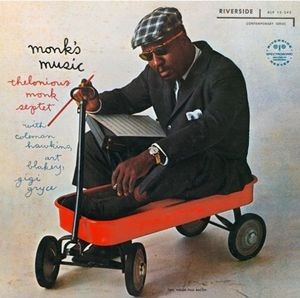生誕90周年を迎えたThelonious Monk

この10月10日が、ジャズ作曲家でありジャズピアニストであるセロニアスモンク(Thelonious Monk)の生誕90周年ということで、NPRで紹介していた。
私がセロニアスモンクをよく聞いていたのはいつ頃のことだろうか。20年にはならないかもしれないが、かなり前のことだ。
個性的モンクのピアノは、繊細なピアノ、精緻なピアノとは言えないかもしれない。初めて聞けば、無骨なピアノと思うかもしれない。弾くべき鍵盤を抜かすというのか、間を大事にするピアノといったらよいのか。それでいてコードが面白く、不思議な魅力にあふれ、聞いていて飽きない。落語でいえば、文楽というより、むしろ古今亭志ん生の芸風だろう。漫画でいえば赤塚不二夫か。
モンクのソロピアノのアルバムもよく聞いたけれど、バンドとのコラボレーションもよく聞いた。
モンクはどれも好きだが、とくに好きなのは、"Ruby, My Dear"などのジョンコルトレーンとの共演だ。とくにニューヨークのファイヴスポットカフェでのライブに関心があった。
今回のNPRの放送は、モンクはニューヨークの都会的なヒップと思われるかもしれないが、モンクの音楽は南部にそのルーツがあるという内容だった。
モンクはノースカロライナ州のロッキーマウントという小さな町で90年前に生まれたのだが、モンクはかなりのお母さん子だったという。その意味で、お母さんの趣味・嗜好性など、母親の影響は無視できない。それと教会。
Monk’s Musicというアルバムの中にAbide with Meという曲がある。これなどは教会の音楽的影響だという。"Abide with Me"*1とは、賛美歌のようだが、この和音は美しい。Abide with MeからWELL, YOU NEEDN’Tに移るときのリズムはいつ聞いてもぞくぞくっとさせてくれる。そして美しいRuby, My Dearへと続く。
理由は判然としないがモンクは亡くなる6年前にピアノを止めて、1982年に亡くなっている。
以下は、NPRのAll Things Consideredから。
http://www.npr.org/templates/story/story.php?storyId=15159351
Digging Up Thelonious Monk's Southern Roots
Today marks the 90th birthday anniversary of Thelonious Monk.
The jazz composer and pianist is remembered mainly for his time in New York, where he developed a unique, eccentric musical genius and a stage presence to match. But he was not a native New Yorker: 90 years ago today, Monk was born in the small town of Rocky Mount, N.C.
He left the South for New York with his mother and siblings at the age of five. Still, some scholars and fellow musicians say Monk's Southern roots had an overlooked but important influence on the man and his music.
According to Sam Stephenson, author of an Oxford American article about Monk's Carolina roots, Rocky Mount was a thriving city in 1917, when Monk was born. An intense tobacco culture flourished, and the rail yard was one of the largest in the entire South. Stephenson speculates those railways may have inspired Monk's composition "Little Rootie Tootie," which features explicit train whistle sounds.
"He was almost five years old when he left here, and certainly he was well old enough to remember," Stephenson says. "There would be train whistles all throughout this neighborhood all day long and all night long ... There aren't any train whistles in New York City."
Allan Gurganus, a writer from Rocky Mount, says he hears the legacy of Monk's birthplace in his playing.
"The combination of that industrial sound overlaying a sense of strangled melody, which is what you feel in him sometimes –- this flirtation with the melodic that's then sort of suppressed by these big cords and percussive overlay -– I can't help hear Rocky Mount when I hear the music," Gurganus says.
Jazz in the United States is often associated with urbanity and New York, among other major cities. However, a number of Monk's fellow jazz greats were also born in the South: The Carolinas alone can also claim Dizzy Gillespie, John Coltrane and Max Roach.
Perhaps more important than the South at large, however, was the influence that Thelonious Monk's mother exerted upon him. The pianist's son, T.S. Monk, recalls the presence of his grandmother in the Monk household.
"Now Thelonious was a mama's boy," T.S. Monk says. "I mean, for real. And his mother lived with us, and died with us, in the same house."
From his mother — who came from a well-to-do part of Rocky Mount's black community — Thelonious Monk inherited her taste in fine music, foods and clothing, according to Sam Stephenson.
Monk also inherited a devout commitment to the church, and to gospel music. On one of his albums, usually packed with original compositions, Monk recorded a old hymn called "Abide By Me."
"I know that that was a reminder to him about the church," T.S. Monk says.
According to Stephenson, Monk returned to North Carolina only a handful of times, and only once for an extended engagement, a 10-day stint at the Raleigh's Frog and Nightgown club in 1970. Still, he was proud of his Southern roots.
"Here's what Monk used to always tell me," says Paul Jeffrey, a saxophonist who worked with Monk for six years. "'You know,' he said, 'I'm a Tar Heel.' I think he was proud of being from North Carolina."
*1:私の持っている電子辞書によれば、"Abide with Me"は、Henry F.Lyteが1847年に作った賛美歌とある。例によって俺が知らないだけなのだろう。「日暮れて四方(よも)はくらく」という意味だそうだ。